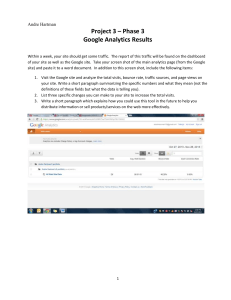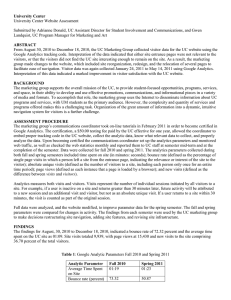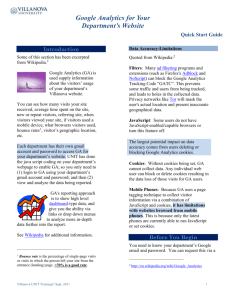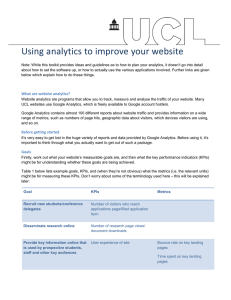Google Analytics
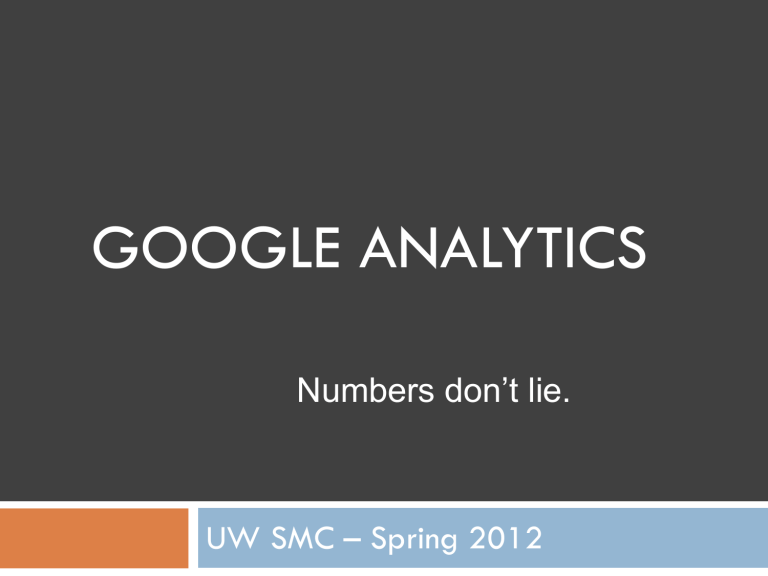
GOOGLE ANALYTICS
Numbers don’t lie.
UW SMC – Spring 2012
What is Google Analytics For?
Free web-based program that records activity on your website. It can tell you:
Number of daily/weekly/monthly visitors
Most popular pages on your site
Referral sources (where traffic is coming from)
Geographic location of your users
How long visitors stay on your site
Search keywords people are using to find your site
Pros vs. Cons
PROS
Free
Simple interface
Easy implementation
Track multiple sites
Integration with
Google Ad Words
CONS
Google owns the data
Limited reports
No historical data for new campaigns or initiatives
The Bottom Line
Imagine you had an article published in the local paper, and then somehow you found out exactly how many people read the article, how many people looked at the headline but didn’t read it, and how many people started reading it but then lost interest in a few seconds.
Would this information change the way you wrote your next article?
Viewing Your Dashboard
Main Menu
Visitors
A person that comes to your site is a visit. That session by a user counts as a visit and as a visitor. Any future visits by the same user count as additional visits.
Unique Visitors
Same as above, but all additional visits by the same user don’t count as a new visitor.
Page Views
Total number of pages viewed on your site. A visit can contain multiple page views.
Main Menu
Pages/Visit
The number of pages a visitors sees during a session.
Average Visit Duration (Time on Site)
How long a user stays on your site before leaving.
Bounce Rate
Users that only see one page per visit are said to
“bounce” off your site.
% New Visits
The percentage of visits from first-time visits (people who had never visited your site before).
Other Key Metrics
Traffic Sources
Overview of different sources that send traffic to your site (search, direct, referral).
Content
Page views, top pages, site overlay.
Goals/Conversions
For non-commerce sites, goals and conversions are the primary way to measure how a site fulfills business objectives. These include receipt pages, subscription confirmations, etc.
Painted By Numbers
Marketers are rarely short on numbers.
We’re short of understanding what to do about numbers.
Analysts have a habit of sending out data instead of insights.
Bosses need insights to make informed decisions.
Often, Less is More
“67.3% of visitors…" can be too precise, and it’s certainly not memorable.
Whereas "two-thirds of visitors…" takes the data issues away and allows the audience to focus on what the two-thirds of visitors did or didn't do.
Develop an elevator speech, if it helps.
Make it memorable, make it short.
Questions?
How to Get Started
You must have a Google account
Create a Google Analytics account at http://analytics.google.com
Add your website to track
Embed JavaScript tracking code to your site
Start monitoring!
Everything under one roof: http://www.google.com/analytics/learn/index.html
GOOGLE ANALYTICS
Presented by Derek Belt
@derekbelt
UW SMC – Spring 2012


